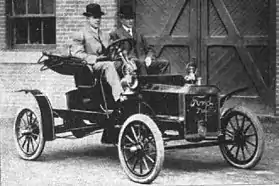Ford Model N
The Ford Model N is an automobile produced by Ford Motor Company; it was introduced in 1906 as a successor to the Models A and C as the company's inexpensive, entry-level line. It was built at the Ford Piquette Avenue Plant.
| Ford Model N | |
|---|---|
 Henry Ford riding in a Model N in front of the Ford Piquette Avenue Plant in Detroit, c. 1906 | |
| Overview | |
| Manufacturer | Ford Motor Company |
| Also called | Model R Model S |
| Production | 1906–1908 |
| Designer | Henry Ford |
| Body and chassis | |
| Class | Entry-level |
| Body style | 2-row phaeton |
| Powertrain | |
| Engine | 149 cu in (2,440 cc) 15 hp (11 kW; 15 PS) Model N[1][2][3] straight-4 |
| Transmission | 2-speed planetary[2][3] |
| Dimensions | |
| Wheelbase | 84 in (213 cm) |
| Curb weight | 800 lb (363 kg) (1906); 1,050 lb (476 kg) (1907 Model N); 1,400 lb (635 kg) (1907 Models R and S)[2] |
| Chronology | |
| Predecessor | Ford Model F |
| Successor | Ford Model T |
The Model N diverged from its predecessors in that it was a front-engine car with a four-cylinder engine. The 15 hp straight-four drove the rear wheels via a long shaft. This was also the first American car to use vanadium steel.[4] The car had a wheelbase of 84 in (2,100 mm).
A successful model, 7000 cars were made before production ended in 1908. At US$500, the car was viewed as highly affordable at the time; by contrast, the high-volume Oldsmobile Runabout went for $650,[5] Western's Gale Model A was $500,[6] the Brush Runabout $485,[7] the Black $375,[8] and the Success for $250.[5] Maroon was the only factory color for the Model N.[3]
Model R
The Model R was a higher trim level of the Model N with a larger body, wheels covered by full fenders, running boards,[2] and oil lamps. Model R was $650, $150 above the $500 base Model N. The Model R was a 1907 model year offering, and 2500 were sold.[2] Color was primarily dark green, with leather seats, brass fixtures, and a fuel tank holding 8 US gal (6.7 imp gal; 30 l). Other differences from the Model N included 30-inch tires, a rounded trunk, and a McCord mechanical oiler, rather than the Model N-style exhaust pressure oiler.
Model S
Two Model S styles were produced, a runabout and a roadster. The S runabout first appeared in late 1907 model year, and was similar to the Model R, selling for $50 less than the R, at $700. Both models were sold for a short time before the R was discontinued for model/fiscal year 1908. The S roadster, like the R, had fenders attached to running boards, and a mechanical oiler. Differences from the R included Model N-style 28-inch tires and the pointed trunk.
The Model S Roadster was based on the same chassis as models N, R, and S runabout before it. Making its appearance during Ford fiscal/model year 1908, the S Roadster had an enclosed cowl, full fenders and fender aprons, and a third "rumble" seat. Like R and S runabouts, the SR used a McCord pressure oiler. Like Model R, the S Roadster was equipped with 30-inch tires. The S Roadster and Model K Roadster were the last models produced during the summer of 1908 as Ford retooled and prepared for the advent of the Model T. [9] The S Roadster sold for $750. Extras such as a convertible top, gas lamps, and umbrella holders were available. 3750 S Roadsters were sold between 1908 and 1909.
References
- Boggess, Trent. "1907 Model N Ford Engine". Retrieved 2015-03-31.
- Kimes, Beverly (1996). Standard Catalog of American Cars 1805-1942. Krause Publications. ISBN 0-87341-428-4.
- "1906 Ford Advance Brochure". The Old Car Manual Project. Retrieved 2015-03-31.
- Lacey, Robert (1986). Ford: The Men and the Machine. ISBN 0-316-51166-8.
- Clymer, Floyd. Treasury of Early American Automobiles, 1877-1925. New York: Bonanza Books, 1950., p. 32.
- Clymer, Floyd. Treasury of Early American Automobiles, 1877-1925. New York: Bonanza Books, 1950. , p. 51.
- Clymer, Floyd. Treasury of Early American Automobiles, 1877-1925. New York: Bonanza Books, 1950. , p. 104.
- Clymer, Floyd. Treasury of Early American Automobiles, 1877-1925. New York: Bonanza Books, 1950., p. 61.
- Clymer, Floyd. Treasury of Early American Automobiles, 1877-1925. New York: Bonanza Books, 1950., p. 120.
Further reading
| Wikimedia Commons has media related to |
- David L. Lewis (2005). 100 Years of Ford. Publications International. ISBN 0-7853-7988-6.
- "Early Ford models 1903–1908". Retrieved August 20, 2006.
